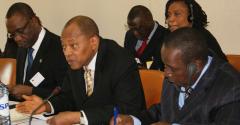SPEECH: Opening remarks by the Secretary-General, Dr Mohamed Ibn Chambas, during the ACP Meeting with the UN High Representative for the Least Developed Countries (LDCs), Landlocked Developing Countries (LLDCs) and Small Islands Developing States (SIDs) –
 Our Chief Guest, Ambassador Cheick Sidi DIARRA –
Our Chief Guest, Ambassador Cheick Sidi DIARRA –
United Nations Under-Secretary-General,
High Representative for the Least Developed Countries, Landlocked Developing Countries and Small Island Developing States, and
Secretary-General of the Fourth United Nations Conference on Least Developed Countries,
Excellency, Ambassador Bocar BA – of Mali – Chairman of the Working Group on LDCs meeting
Excellency Ambassadors, Distinguished Ladies and gentlemen
It gives me great pleasure to welcome Ambassador DIARRA, our chief guest to ACP House. I particularly would like to thank him for making time out his busy schedule to meet the ACP Group represented here today by Ambassadors and various representatives of ACP Missions. Today’s meeting is being held in the context of preparations for the participation of the ACP Group at the forthcoming Fourth United Nations LDC Conference that is due to be held in Istanbul, Turkey from 9 – 13 May 2011.
This is a very important conference for the majority of ACP States. You may be aware that 40 out of the 48 Least Developed Countries recognized by the United Nations are members of the ACP Group. This is not a positive credential. It would be great joy for all of us, to see the 40 LDC Members of our Group, achieve substantial, sustained and sustainable growth and development, and as a result graduate out of this category of countries, as quickly as possible.
Indeed it is poignant to note that since the LDC category of States was established by the United Nations in 1971, the number of LDCs has increased from 25 to 48 today. Only 3 countries have graduated from LDC status. Botswana in 1994; Cape Verde in 2007; and Maldives in 2011. That record is not impressive and should be reversed. In this regard, while recognizing that the destiny of each LDC State lies primarily in the actions of its government, there is need for further enhanced international actions to provide complementary support.
The assessment of the performance in the last decade show that LDCs made considerable efforts in implementing the commitments contained in the Brussels programme of action agreed in 2001. It is reported that wide ranging economic reforms have been undertaken, including macroeconomic, public sector reform, privatization and trade and financial liberalization. Growth has improved considerably driven mainly by high primary commodity prices and better macro-economic management.
However, improved economic performance, particularly for African LDCs, did not contribute to commensurate gains in poverty reduction apparently because growth was driven by capital intensive extractive sectors, which had a limited impact on employment creation. The focus should shift from simple exploitation of natural resources and production of raw materials to value addition and diversification. It is necessary that we address this quagmire facing the LDCs.
In the area of trade, preferential trading schemes such as the “Everything but Arms” (EBA) facility and AGOA provide market access advantages. However, these facilities have been under-utilised partly due to restrictive rules of origin; non tariff and technical barriers, environmental and health standards in addition to the weak productive and supply capacity on the part of the LDCs.
Indeed the constraints to LDCs achieving high and sustained economic performance have eloquently been spelled out in the various national and regional reviews of the Brussels Programme of Action. What is needed is fresh thinking. Thinking out of the box, so to speak. The ACP group stands ready to play its role in this process.
It is for this reason that the ACP Group decided to organize itself and see how to contribute to the preparations and ensure effective participation at the Fourth United Nations Conference on LDCs.
An ad Hoc Working Group was established. It is chaired by Ambassador Bocar BA of Mali. The Working Group is charged with the responsibility of ensuring that the challenges confronting ACP LDCs are given due attention in the preparatory process and taken into consideration in the outcome of the Conference. In this regard through the Working Group, the ACP Group is working in concert and developing synergies with not only the European Union our main development partner, but also other relevant UN agencies and international organizations involved in the preparatory process.
The proposed approach for the ACP Group’s participation at the Conference has three main components. The first one is the preparation of an ACP Document that will cover concerns and interests of ACP LDCs that will be disseminated as a working document for consideration during the Conference. We would like some guidance on the process of submitting this document into the UN system.
The second approach concerns the Official Statement of the ACP Group to be delivered by the Secretary-General on behalf of the ACP Group at the plenary session during the Conference. We understand that statements on behalf of the Group will be allowed six minutes. Here again we seek your guidance on the procedure for registering and getting a slot to speak.
The third approach relates to the organization of appropriate side events in collaboration with some ACP cooperating partners. We are in discussion with the ITC and others such as UN-HABITAT and OIF to agree on the modalities for the effective participation. One idea is to mount an exhibition jointly with the CDE and the CTA under the auspices of the “World Export Development Forum 2011” being organized by ITC on the margins of the conference.
Mr. Chairman,
It is now my pleasure to introduce Ambassador Diarra.
